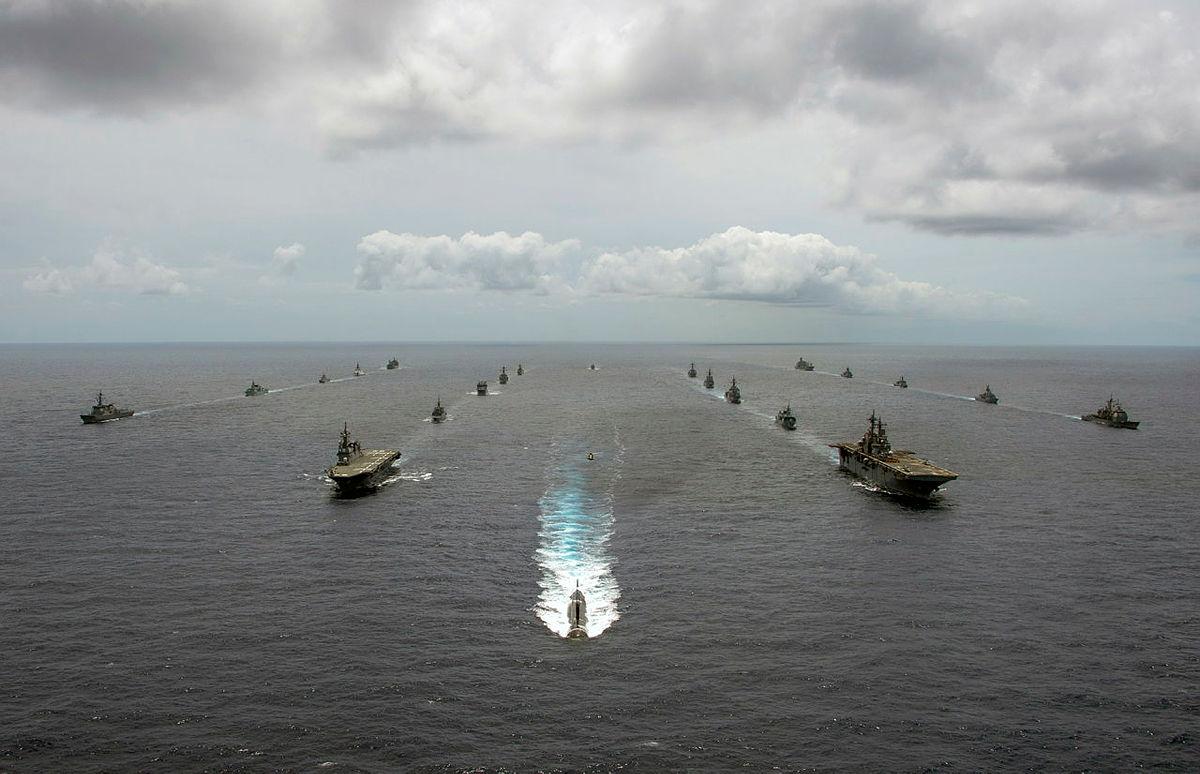
Sea state
The 2020 iteration of the biennial Exercise Rim of the Pacific, or RIMPAC, has just concluded. Ten nations (Australia, Brunei, Canada, France, Japan, New Zealand, the Philippines, Singapore, South Korea and the US) participated in the two weeks of exercises, held off the coast of Hawaii. RIMPAC 2020 was conducted at sea only, due to the Covid-19 pandemic, and included cooperative anti-submarine operations, practice intercepting vessels at sea, and firing exercises. Australia’s HMAS Hobart air warfare destroyer took part in a multilateral live-fire drill, showcasing the air-defence capability of its SM-2 missiles.
An investigation has been opened into the possibility that a sailor may have deliberately lit the fire that burned for several days on USS Bonhomme Richard in July. The incident may have destroyed the amphibious assault ship. If the fire was started intentionally, it could be one of the most expensive cases of arson ever. The suspect has been questioned but not charged and the investigation remains ongoing.
Flight path
The Japanese defence ministry has invited foreign companies to become involved in developing its F-X ‘future fighter’ program. Japan is seeking capabilities that are at high technology-readiness levels, such as airborne missile systems, electronic warfare equipment, systems integration technologies and unmanned air vehicles. The ministry plans to appoint a Japanese company as the primary contractor, but is looking for international companies to support ‘the integration of the aircraft’.
On 28 August, six US B-52 bombers and 80 fighter aircraft from countries including France, Germany, Canada, Turkey and the UK conducted a flyover of all 30 NATO member states to provide training and enhance interoperability. NATO Secretary General Jens Stoltenberg said that the mission, dubbed ‘Allied Sky’, would ‘deter aggression, prevent conflict and preserve peace’. The US has conducted more than 200 Bomber Task Force exercises with its global partners and allies since 2018.
Rapid fire
A video of a collision between American and Russian armoured vehicles in Syria has emerged after days of speculation and reciprocal blaming between the two countries. The clip of the incident, which left four US soldiers with minor injuries, was published by a Russian website. American officials say the crash happened in the eastern Syria deconfliction zone, an area Russian troops are prohibited from entering, while the Russian government says the US troops were obstructing one of its patrols.
The UK government could soon cancel the replacement of the British Army’s Challenger 2 tanks, as the defence ministry attempts to redirect funding towards cyberwarfare. The US and Germany have upgraded their tank fleets twice since Challenger 2 was introduced in 1998. Experts have raised concerns that cuts to key parts of the British Army might have a negative impact on its sovereign capabilities.
Final frontier
This week, the ABC’s Four Corners program examined the opportunities and challenges of a new space age. Space exploration has become more affordable and accessible for entrepreneurs but the international regulatory framework has not kept pace with developments. Policymakers and scientists will grapple with nations’ desires to exploit the moon and asteroids for resources, the growing militarisation of space, and an increasing number of satellites in low-earth orbit. Threats to critical satellite services, including space junk and orbital accidents and collisions, are expected to exacerbate geopolitical tensions.
A new report by astronomers anticipates that ‘mega-constellations’ of satellites in low-earth orbit will have a negative impact on night-sky observers. Satellite trails will severely affect wide-field telescopes, and programs searching for near-earth objects and distant solar systems during twilight hours will be disproportionately impacted. The report recommends developing software for the general astronomy community to track satellite trails, deploying satellites no higher than 600 kilometres and making satellite positional data public.
Wired watchtower
China’s Ministry of Commerce has announced restrictions on exports of artificial intelligence technologies that will likely have implications for the sale of Chinese social media app TikTok. The limits, which come after US President Donald Trump effectively banned the app, mean the purchase of TikTok from parent company ByteDance would require Chinese government approval. The restrictions are being viewed as a way for the Chinese government to either block the sale of the app, raise the price, or give itself greater influence by imposing new conditions on the sale.
Twitter has taken down a number of accounts responsible for a spam operation that sent out tweets supposedly from African American voters who said they were abandoning the Democrats to vote for Trump. Some of the tweets were shared tens of thousands of times. Social media companies and government agencies in the US have been on high alert to counter attempts at interference in the lead-up to November’s presidential election.